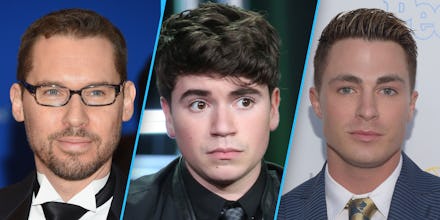Why Noah Galvin Shouldn't Have Apologized for His 'New York' Magazine Profile

In retrospect, The Real O'Neals star Noah Galvin's New York magazine profile was too good to be true.
The 22-year-old out actor got remarkably real about a variety of topics, including director Bryan Singer ("Bryan Singer likes to invite little boys over to his pool and diddle them in the fucking dark of night") and fellow gay actor Colton Haynes ("That's not coming out. That's fucking pussy bullshit"). Appropriately enough, the profile, published on New York's entertainment news site Vulture, was headlined "Noah Galvin Has Nothing to Hide."
Just over 10 hours after the interview's publication, Galvin recanted. He apologized to Singer, Haynes and actor Eric Stonestreet, whose performance on Modern Family he criticized in the interview. "The entire interview I gave to Vulture has hurt the LGBTQ community and the industry I feel truly fortunate to be a part of," he said. "I apologize to everyone that I've hurt with my comments, and understand the damage that has been done."
It's understandable why Galvin felt the need to apologize, for myriad reasons. But it's deeply disappointing that he actually did.
Let's be clear: Galvin spoke more freely than literally any network sitcom star with proper media training should have. If he needed to apologize to anyone, it should have been his publicists for giving them a veritable PR hurricane to manage.
The joke about Singer was unwise if he wasn't prepared to stand by it. Sure, a clarification that it was a joke would have been smart. But an apology speaks to something happening behind the scenes — perhaps even threats of legal action, since Galvin's word choice ("little boys") implies sexual abuse of a minor, and thus could rise to the level of libel. It's wise to bet New York removed the Singer quote for this very reason even before Galvin tweeted his statement.
Let's accept as hypothetical fact for a moment that Galvin apologized because of legal pressure. Why, then, did he also apologize for his statements about Haynes and Stonestreet? Everything he said about them, though brusque, was personal opinion, not libelous. (It is worth noting, as Time's Hollywood editor Sam Lanksy did on Twitter, that Singer and Haynes are both represented by the same publicist, Simon Halls.)
The far reach of the apology is dismaying. Here's a 22-year-old gay actor who has divisive opinions and isn't afraid to express them. Galvin, as Vulture's headline reads, had "nothing to hide." Yet, within 10 hours, he was put back into hiding.
Indeed, after Galvin's apology came a swarm of disheartened reactions on Twitter. Even those who didn't agree with what he said in the profile were disappointed he had to recant.
The dark truth here is that not everything a celebrity says is going to be agreeable. By virtue of being human, they have opinions, and those opinions won't please everyone. With tools like Twitter and Tumblr, fans can express their disappointment, even anger, with those celebrities. But if celebrities stopped having opinions altogether, Hollywood would become quite dull.
There are limits, of course: Racist, homophobic, transphobic and sexist statements aren't acceptable just because entertainment media would be boring without them. But to watch Galvin have to eat his words simply for being indelicate in his opinions about a group of men makes a sad statement about Hollywood today. It's hard to imagine Galvin will ever give an interview like this again, considering the firestorm in which he's now embroiled.
Galvin's statement wasn't just about avoiding legal threat. It wasn't just a make-nice move to prevent further controversy. It was a sign that being outspoken, brash and opinionated is something to apologize for.
Read more: